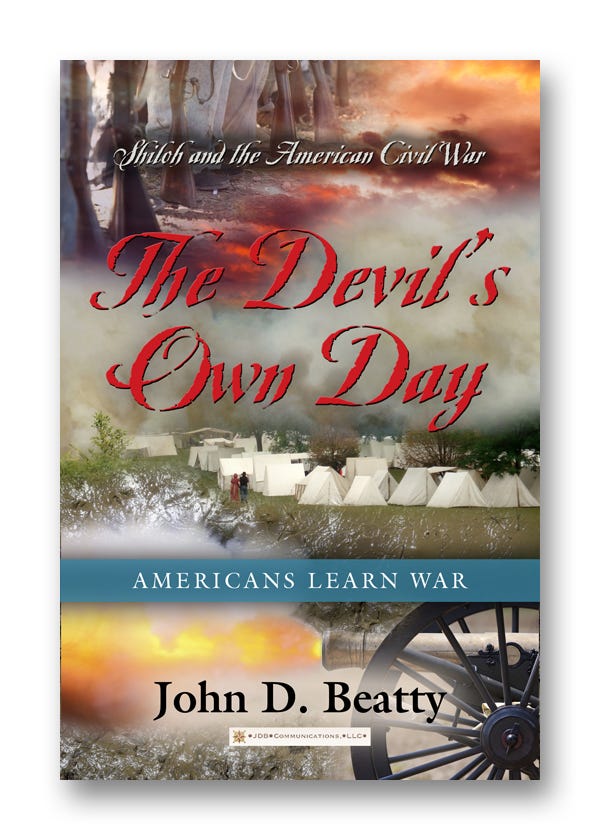Mother’s Day 2023
Tomorrow is Mother’s Day, and the tenth year that my mom’s been gone. One of my surrogate mothers, Audra, passed in 2019 right around now. But there’s still Lucie, my mother-in-law.
Happy day tomorrow, Mutti. And of course there’s Ev, shown here in front of the Brandenburg Gate in Berlin in 2015. Last time I saw it in 1976, there was a wall in front of it. Much rather see my honey in front of it.
Happy day tomorrow, babe. And a happy day tomorrow to all the rest of you moms out there.
CK ‘73 Reunion Update
Susan just sent out an update email, with sixteen electronic registrants…not bad. If you still want to register online, go here. It doesn’t include the mail-ins, and I know some of you don’t buy online. If you have mailed your registration, tell me or Lucy. We kinda need a rough headcount.
Just a month out, now. The party we’ve been waiting half a century for…
Did Buell Save Grant At Shiloh?
On the afternoon of 5 April 1862, the 40,000 men of the Union Army of the Ohio, commanded by Don C. Buell, reached the Tennessee River across from Pittsburg Landing. Buell’s boss, Department of the Missouri commander Henry W. Halleck, had ordered Buell to join with Ulysses S. Grant’s Army of West Tennessee before attacking towards Corinth, Mississippi. The next morning, Albert S. Johnston’s Army of Mississippi attacked Grant’s army, driving Grant’s 40,000 men towards the Tennessee River. This much is not in dispute…but…a question scholars and pundits and other blowhards have argued about ever since is…how much trouble was Grant in at sundown on 6 April 1862? So…
Did Buell “save” Grant at Shiloh?
This question spawns three others:
Did Grant need saving?
Could the Confederates destroy Grant or take Pittsburg Landing?
Could Buell save Grant?
Did Grant Need Saving?
Grant and his officers stabilized the situation at Shiloh before full dark Sunday. They well emplaced the army behind substantial artillery reserves, had enough muskets on the line to support the guns and protect the ammunition stores. Lew Wallace’s wandering 2nd Division would show up an hour after sundown, and Grant still had the firepower of the gunboats if he needed them to protect his hold on Pittsburg Landing. Grant was in no danger when Pierre GT Beauregard stopped the last attack near dark—about 6:15 PM.
Several sources claim Buell showed up just in time to blunt the Confederate attack Sunday.
Contemporary reports and the realities of the river operation make this claim questionable. Many factors make it unlikely that the first of Buell’s men could have crossed any faster or in any larger numbers than they did—a brigade of 4,500 men with no artillery of its own—before dark. The final 60-gun barrage of Grant’s defensive line—which Buell later dismissed as being only perhaps a dozen guns—had already done its work by the time Buell had enough firepower on the line to have any influence at all. Grant’s report on the battle gives Buell’s army some credit for blunting the attack, but like the rest of the reports, it was for the consumption of a Congress that gave rewards for participation where there was not really a lot. Buell’s supporters made the maps used to support the “Buell saved Grant at Shiloh” contention from memory long after the battle. Embellished reports and questionable maps are the probable origins of the version of Shiloh that has followed the battle ever since.
Could the Confederates Destroy Grant or Capture Pittsburg Landing?
After a six-day march in torrential rain from Corinth, Mississippi, on short—or no—rations, Johnston’s army fought a horrific battle from before sunup until just after sundown. Gunfire killed their commander that afternoon; sergeants commanded some regiments; some brigades had only a hundred men or fewer left answering the roles. To make matters worse, they endured an hour-long artillery barrage near sundown just when they believed they had won the battle.
An army that had never fought together endured all of this.
The Confederates came to rest on a battlefield with over 10,000 casualties on it. It was raining again, and the army and corps commanders had so little understanding of what was going on there was no attempt to reorganize or feed the men. Only one division commander—John B. Hood—pulled his men back from contact to reorganize.
And Beauregard believed Grant was retreating…and that another Confederate army was on its way
Beauregard, the default commander, indulged in flights of fantasy. He made impractical plans and, like many Confederate officers, believed the fighting spirit of the Confederacy could overcome the material and numerical strength of the Union. He was firm in his belief on Sunday night that Grant would either not be in front of him in the morning, or that Beauregard’s forces could overwhelm the remaining Federals easily…because he “knew” that Buell’s army was miles away. Beauregard also thought that Earl Van Dorn’s 20,000 men from the Trans-Mississippi would march up the road at any time.
The only fresh troops Beauregard would have the next morning were a single Tennessee regiment.
Beauregard’s delusions aside, there was no practical way for his army to attack Grant successfully or capture Pittsburg Landing. His last assault on Sunday consisted of two brigades—only one had ammunition—and one 6-pounder battery. Grant’s 60-plus guns battered, then blasted this weak effort into retreat. Grant was safe, being reinforced by his own 2nd Division and Buell’s slowly arriving troops. Rescuing he did not need, and he was planning a counterattack.
Did Buell want to save Grant?
There is some evidence that Buell may have crossed the river for reasons other than to support a general he openly disliked. William Sherman later wrote that on Sunday Buell acted as if he expected Grant’s army to be gone in the morning, and feared that Buell would bring none of his army across. Buell’s generals left at least half their strength behind and brought only two batteries of artillery across by dawn Monday (though other factors influenced this). If he had wanted to help Grant, new, full divisions with their artillery would have dwarfed Grant’s ragged survivors. So why did Buell’s division commanders leave much of their strength and supply behind? One traditional reason is that Buell’s army wanted in on the fighting, and the faster they could get there, the better the chance they would have at glory. This explanation goes to the heroic vision most readers have of the Civil War, and fits well with the tone and style of other writings. But still: why leave so much behind? The four unblooded yet incomplete divisions, hungry and weary as they were, extended Grant’s line considerably and gave it more stability, but probably weren’t necessary to push Beauregard back. Two of Buell’s huge (most of his divisions were twice the size of Grant’s), complete divisions would have done the same thing.
What the steamboats delivered beginning Sunday afternoon was about all they could deliver.
Buell may have had it in his head that he would need as many maneuver units as he could get to do whatever he wanted to do without having to accept orders from Grant. Fewer (if larger) divisions would have made Buell’s “independence” an impossible fiction to maintain. It’s likely that Buell knew it would be difficult to get his artillery across—one six-gun battery took up as much steamboat capacity as an infantry brigade of 4,000 men—so he settled for the apparent strength of four divisions. Buell’s attitude on Sunday afternoon was that of a peevish child, snapping at others for doing what they thought best. But we could easily write it off as the attitude of a general who was technically under the command of someone he saw as inferior. We don’t know for certain what passed between Buell and Grant when they met on Sunday, but among the formalities that typified such meetings, Grant would have showed Buell Halleck’s telegram putting Grant in charge if the Confederates attacked their joint force. For Buell, any subordination to Grant, even if temporary, would have been unacceptable. This might explain why they didn’t meet again until well into Monday or after: Buell simply didn’t want to have to take Grant’s orders.
The answer to the question “did Buell save Grant?” is unlikely.
Grant didn’t need saving; the Confederates couldn’t stay and fight for more than another day; Pittsburg Landing and the steamboats were safe; Buell could not bring enough forces across the river on Sunday or Monday to save anything, and he may not have wanted to.
The Devil’s Own Day: Shiloh and the American Civil War
The foregoing is just one of the many issues that readers of The Devil’s Own Day could address.
Look for the Second Edition of The Devil’s Own Day after 5 June.
Coming Up…
Writing History for Entertainment
Two Events, One Result
And Finally…
On 13 May:
1607: Jamestown colony was founded in what is now Virginia. The colonists continuously inhabited the first permanent English settlement in the New World for only two years, but revived it in 1611 with a new batch of colonists…and my distant ancestor in chains from Ireland.
1917: Lucia (later known as Fatima) began her visions at Fátima Santarém, Portugal. She and her two young companions said they saw Mary, the mother of Jesus, who admonished them to pray for world peace. Since the US had just declared war on Germany, France, Britain and Italy were just beginning fruitless offensives, and the first Portuguese troops had just arrived in France, that was a tall order.
And today is NATIONAL FROG JUMPING DAY. Related to the Twain story, perhaps, but this is the day that Calaveras County has their festival.






